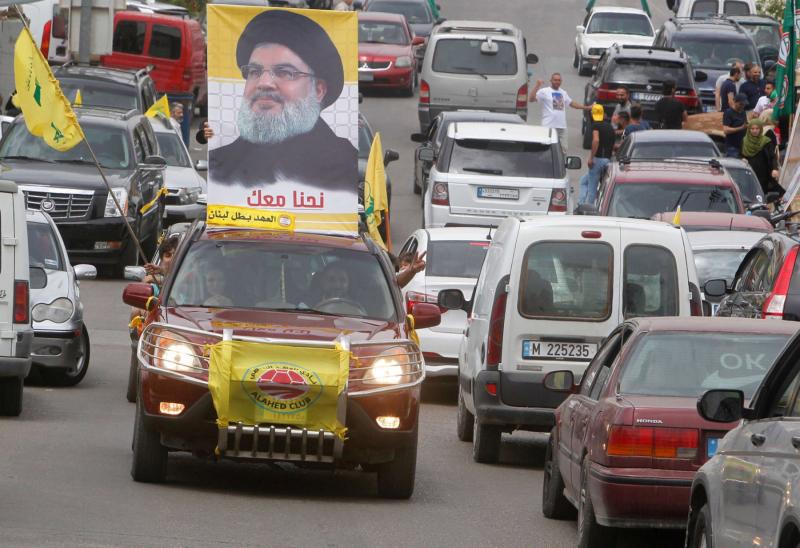Makram Rabah/Do or die for Lebanon’s failing economy
Makram Rabah/The Arab Weekly/July 22/18
Lebanon’s ruling elite has shown neither vigour nor foresight in addressing the challenges.
With the FIFA World Cup over and French victory secured, people can go back to discussing the mundane topics of weather and other worldly affairs. For the Lebanese, this means a return to politics and, principally, the economy, which, many observers say, stands on the point of crashing.
Not one usually wary of accusations of scaremongering, Gebran Bassil, caretaker foreign minister and son-in-law of Lebanese President Michel Aoun, said: “Lebanon’s economy was on the verge of collapsing.”
While Bassil’s economic prophecies are largely more to do with his strategy of demonising Lebanon’s Syrian refugees and blaming them for the country’s problems, the fear of an economic failure is not unfounded
As it stands, Lebanon’s public debt is $80 billion, the third highest globally as a percentage of GDP (150%) with more than one-third of the annual budget dedicated to servicing the country’s debt, making — without significant change — economic recovery impossible.
Discussion of potential collapse brings back memories of the 1986 crash, which saw the value of the Lebanese pound plummet, leading to inflation and resulting in the loss of savings for most Lebanese.
Despite the civil war, the pound had been stable against the dollar, trading at around 3 pounds. However, the crash saw it reach 2,825 pounds to the dollar in 1992. The Lebanese Central Bank (BDL) intervened by fixing the exchange rate, a measure that remains in effect.
While pegging the currency to the dollar might work as a protective measure, it is not without constraints, hindering growth and placing an additional burden on Lebanese state coffers.
“The main problem today is that fiscal policy is almost non-existent, which forced the BDL to go beyond its mandate of monetary policy and do things it should never do,” said Walid Marrouch, associate professor of economics at the Lebanese American University
Marrouch said approximately 80% of Lebanon’s budget goes to public sector salaries and benefits, plus the cost of servicing the debt. The remaining 20% is allocated for fiscal policy. However, “the corruption of the ruling elite is making this meagre 20% smaller and their refusal to pass policy reforms draws the fiscal crisis even closer,” he said.
Only recently did the effects of the government’s persistent failure reach the housing sector when the government suspended subsidies on housing loans, which will cause dire repercussions for first-time homeowners.
However, the true tragedy of the housing crisis is beyond straightforward economics and speaks to the years of corruption and abuse of the real estate market, because politicians and lawmakers manipulated circumstances to keep prices artificially high.
Many of those responsible for the country’s government are developers or heavily invested in real estate projects. As such, they have gone out of their way to thwart taxes or legal measures that would benefit rentals at the expense of the housing market, leading to the current crisis.
Despite the alarming symptoms of Lebanon’s deteriorating economy, the ruling elite has shown neither vigour nor foresight in addressing the challenges. Instead, it has continued its game of thrones.
Caretaker Prime Minister Saad Hariri, selected to form a new cabinet, has failed to put forth a lineup that would be instrumental for adopting promised reforms.
The $11 billion grant and loan package, which the international community earmarked at the CEDRE conference in April to help Lebanon overhaul its infrastructure, hinges on Hariri’s ability to form a cabinet, a process that seems to have become bogged down by internal bickering and corruption.
Though the auguries appear grim, there may be hope. A capital market expert, speaking on condition of anonymity, said: “A lot of alarmism exists now in Lebanon, some based on inaccurate economic numbers. Nevertheless, the economic environment is worrying and if the trends continue, (it) will be alarmingly so.”Despite this, he said Lebanon’s banking sector provides cause for qualified optimism. It plays a vital role in maintaining the economy and is sure to be critical to any resurgence.
The Lebanese have always gambled that, whatever dark political and economic clouds gather overhead, they will be blown away by the winds of regional political change. Such gambles have borne out, with Lebanon’s central role within the Middle East ensuring a reliable supply of Gulf funds.
Unfortunately, those days are gone. The Lebanese failed to capitalise on any lifeline extended to them, betting on a fairy-tale ending to grim economic times without undertaking fundamental reform.
The Lebanese are becoming increasingly apprehensive about losing their savings and their livelihoods. However, they only received what they voted for, a valuable lesson to not be forgotten.
**Makram Rabah is a lecturer at the American University of Beirut, Department of History. He is the author of A Campus at War: Student Politics at the American University of Beirut, 1967-1975.
Claude Salhani/Hezbollah leaves Lebanon in murky waters
Claude Salhani/The Arab Weekly/July 22/18
Lebanon’s primary export should be prosperity and neutrality, as had long been the case. The “Switzerland of the Middle East,” they used to say. Ah, but those days of political insouciance when the Lebanese would steer clear of regional politics are long gone.
The days when ousted prime ministers from neighbouring countries could find safety and refuge in Beirut no longer hold. Lebanon’s involvement in cut-throat regional politics has left the country in murky waters.
Just as Gulf countries rely on oil and natural gas for prosperity, so Lebanon relied on peace to sell its major source of revenue: hospitality. Lebanon’s major industry was tourism; an industry in which peace and serenity are prerequisites. Lebanon’s tourism was an industry that employed thousands of people and had a positive effect on the country’s economy.
Lebanon’s tourist industry kept the country’s many hotels, restaurants and nightclubs — along with a slew of not-so-kosher industries — busy but that served their purpose. They depended on a peaceful spring and summer to make up for the rest of the year.
Alas, it is practically impossible to promote tourism when terrorism is knocking at your door.
Add to that the fact that Lebanese politicians are their own worst enemies and have yet to draw lessons from the mistakes of their fathers and grandfathers. Despite a 19-year civil war that achieved nothing memorable, the country’s leaders continue to bicker, picking up where their fathers left off.
If “the more things change, the more they stay the same” is applicable to anywhere in the region, a quick glance at Lebanon’s parliament should underline the point I am trying to make. Indeed, that collection of one of the largest gatherings of political and social misfits in the greater Middle East can be found in Lebanon, where most of its members have no qualms in placing the interests of their political or financial supporters ahead of the interests of the country.
It does not help Lebanon that its leader is fully aligned with Iran. Lebanon, like all small countries in the region, bases its stability and prosperity on neutrality in regional conflicts. Lebanon and Iran are not politically compatible. They stand at opposing ends of the political spectrum. Much as Lebanon needs peace and stability to thrive, Iran, by the very nature of its constitution, is constantly looking to expand and export its Islamic revolution. For the revolution to survive and to thrive, Iran needs continued turmoil. Much as the residents of Lebanon enjoy their individual freedom, Iranians under the diktat of the mullahs have their basic rights denied.
The two countries run on opposite tracks and never the two shall meet, at least not in their current political incarnations. Lebanon’s Christians have praised Hezbollah for its success in pushing Israel out of southern Lebanon, giving the Arab world its first major military victory over Israel. Yet the Lebanese Christians also avoided any political alignment with Hezbollah.
As most Lebanese Christian leaders distanced themselves from Hezbollah, one leader — the country’s president — did exactly the opposite. Michel Aoun wanted to be president so badly that he was ready to sign on with the devil so he went into a memorandum of understanding with Hezbollah.
With tensions in the region mounting, this could mean agitated waters lie ahead for Lebanon.
Aoun is preaching on behalf of Hezbollah, telling the Americans that pulling out from the 2015 nuclear deal was wrong and will negatively affect the Middle East.
“The unilateral US withdrawal from the nuclear agreement (in May) will have negative repercussions for security and stability in the region,” Aoun wrote on Twitter on July 16, his first public comment on the accord.
“Lebanon considered (the deal) a cornerstone for stability in the region, helping make it an area free of weapons of mass destruction,” Aoun’s office said in a statement summarising a meeting between the president and Iranian Foreign Ministry official Hossein Jaberi Ansari.
Aoun said he welcomed the commitment of other countries to continue with the deal.
In Lebanon’s May elections, Hezbollah — along with groups and individuals politically aligned to it — won more than half of the seats in parliament, boosting the group politically. Militarily, its combat-tested militia, which experienced some of Syria’s toughest battles in supporting Syrian President Bashar Assad in that country’s civil war, is more powerful than Lebanon’s army.
Under the 2015 accord, Iran won a lifting of international sanctions in return for verifiable curbs on its disputed uranium enrichment programme. US President Donald Trump withdrew Washington from the deal in May, calling it deeply flawed and has reimposed stringent US sanctions, heaping pressure on other signatories, including major European allies, to follow suit.
European powers have reaffirmed their commitment to the accord and said they would do more to encourage their businesses to stay engaged with Iran, though many firms have said they plan to pull out to avoid US penalties.
While Iran beats its chest and “owns” a large segment of the Lebanese political scene thanks to its proxy militia Hezbollah, Lebanon and the Lebanese are left holding the broken pieces of the Lebanese political jigsaw puzzle.
*Claude Salhani is a regular columnist for The Arab Weekly.



















